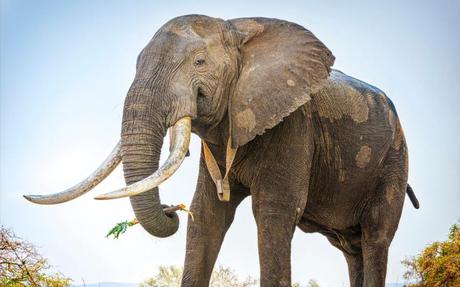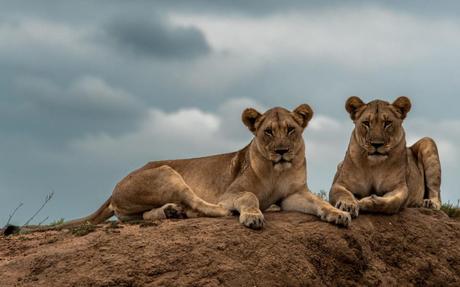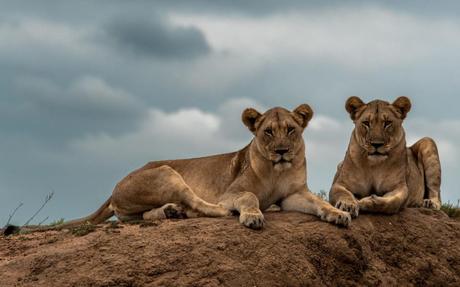
There is truth in the saying "elephants never forget". I learned it the hard way on a safari to Zimbabwe several years ago. I was in Gonarezhou National Park, located in a remote southeastern corner of the country on the border with Mozambique, near an area where landmines were planted during the years of civil war in the late 1970s. Hundreds of animals, including elephants, were killed as a result of human warfare - and the memory of their ancestors remains vivid.
As we drove through the park, we accidentally disturbed a hulking male bull who furiously threw his trunk, kicked up dust and chased us for over ten minutes. Smart enough to predict our escape route, he even took a shortcut to block our path.
I love these savannah giants, but catch them in the wrong mood and they are terrifying. I shudder at the fear a group of tourists must have felt when their safari vehicle was overturned by an elephant in Zambia's Kafue National Park earlier this week, tragically killing one of the passengers.
The scenario is almost unthinkable. But herein lies the problem: accustomed to the pampering comfort of luxury safaris, we have forgotten that we are in the realm of the wild.
A few years ago, I also found myself in a sticky situation in Kafue when my vehicle broke down due to a flat tire during an early morning game drive. Although we had a spare tire on board, the mechanic had forgotten to load a toolbox, rendering it useless. Despite the efforts of my poor guide, no one in camp answered the radio (the receiver was in the bar, which was only served from 10am) and there was no mobile phone reception.
Our only option was to abandon the vehicle and walk - unarmed - through thick, dense vegetation where only a few minutes earlier I had seen a pride of lions tear apart the stinking carcass of a buffalo. To make matters worse, the air was filled with black clouds of tsetse flies: viscous, blood-sucking insects that pierce the skin with painful pinpricks and cause sores that itch so much that you scratch the skin raw.
The story continues
In this case, elephants came to my rescue. I set fire to a ball of dung tied to a stick and used a smoking lollipop to ward off the evil little vampires. As I waved it back and forth, I felt like a priest waving incense into a censer.
Of course it is possible to walk through the bush without being mauled or trampled. The key is to always be careful and follow the instructions of your ranger or guide. These people have an intuitive understanding of the animals that share their living space. It is crucial that they have respect.
On walking safaris I have encountered lions, leopards, elephants, buffalo, rhinos and wild dogs. Despite their years of experience, my guides have always been very alert: listening for movements, checking the wind direction and assessing suitable trees for climbing. They are never complacent.


When I encountered a lion on foot one evening in Malawi's Majete Wildlife Reserve, my guide knew exactly what to do. He calmly instructed me to slowly climb onto a wooden picnic bench and defy every impulse in my body to run.
What happened to the tourists in Kafue was a terrible accident. The guide was stuck in an area where it was impossible to maneuver his vehicle. Otherwise he would have done what any experienced guide would do in that situation: withdraw.
On safari, the only thing between tourists and wild animals is the metal shell of a vehicle, a thin veil of canvas or an elusive but extremely important barrier of mutual respect. If you give an animal space, you will also get space in return.
I have spent hundreds of nights listening to the roar of lions, the screeching giggles of hyenas and the panicked screams of zebras being attacked by leopards. Only once have I ever been afraid that an animal would enter my tent.
One night in Zimbabwe's Hwange National Park, I awoke to the disastrous crash of objects in my open-air bathroom. The shadow of a log swinging dangerously close to a tarp, close to a full bladder of water above the bucket shower, immediately gave away the perpetrator. Despite my friend's panicked pleas, I avoided the shame of blowing the safety horn. (After introducing myself to camp managers the day before as an experienced African traveler, my pride got the better of me.)
Miraculously, nothing was broken upon inspection the next morning; the only thing missing was a bar of soap. After sharing my story over breakfast, I discovered we had a thief in our midst. Our tent was the fifth tent that the toiletry-guzzling elephant had raided that night.


On safari, travelers can expect encounters with creatures large and small, and ironically, some of the biggest threats are posed by the smallest beasts. According to the World Health Organization, there were 233 million cases of malaria on the African continent in 2022 and 580,000 deaths. Prophylactics are a very effective precaution, so consult a doctor (but keep in mind that they will always err on the side of caution) and look for up-to-date information for any destination you plan to visit.
The closest shave I ever had while hospitalized on safari was due to an insect almost smaller than a pepper. I had been warned about ticks in the long grass of South Africa's Phinda Private Game Reserve, but photographing a pangolin at eye level was too good an opportunity to resist.
Days later, a red rim appeared on my stomach, growing deeper and deeper until it resembled the molten crater of Mount Etna. Dr. Google revealed that I probably had tick-bite fever, nothing a double dose of anti-malarial drug Doxycycline couldn't cure.
On balance, a safari does not pose any more danger than, for example, a walking holiday in the Alps. Accidents can happen anywhere, even during a beach holiday in Spain. But observing wildlife requires a certain amount of humility. We are visitors to their place, and just like humans, they have emotional and defensive responses. Some days they may be happy, other times they may be sad. Or maybe they're just looking for something as simple as a bar of soap.
